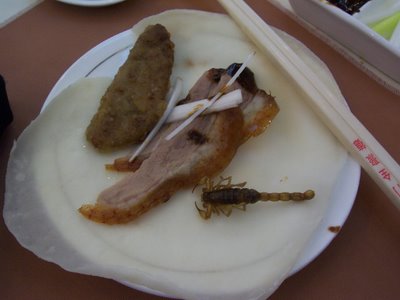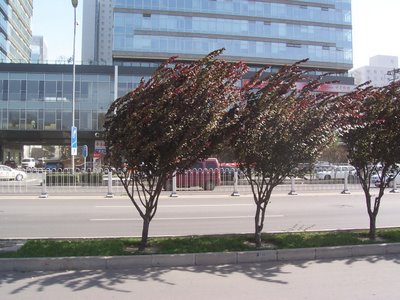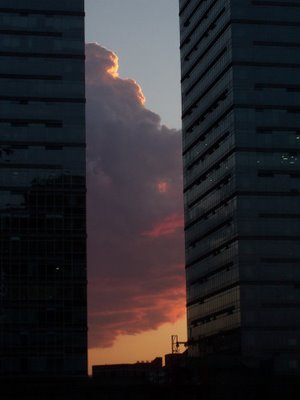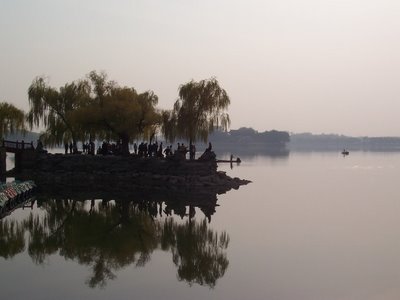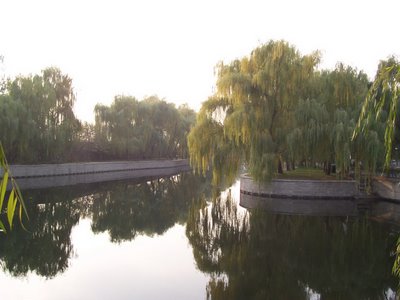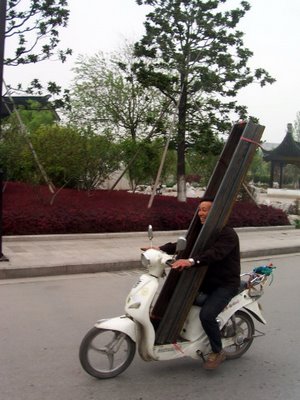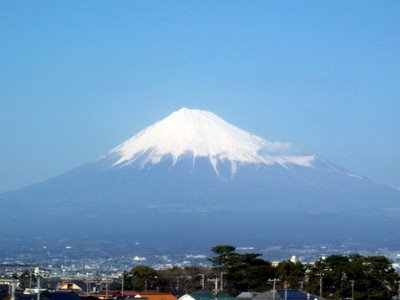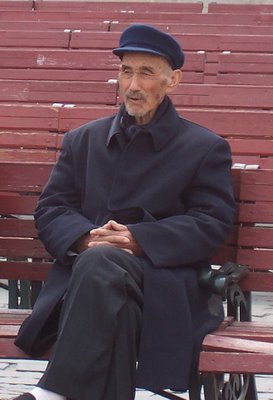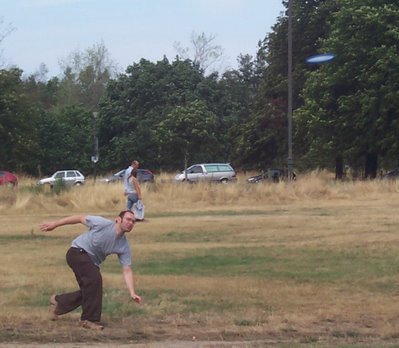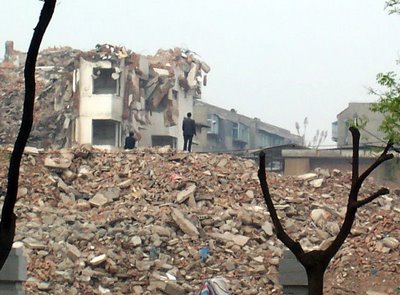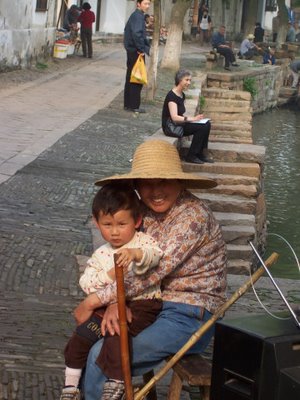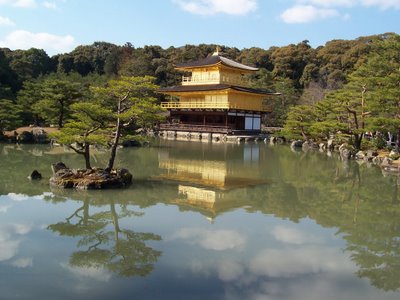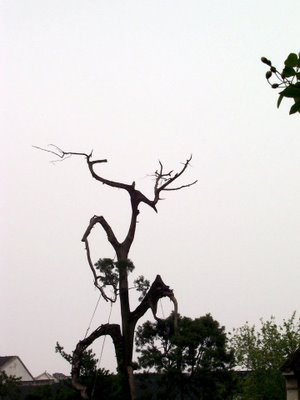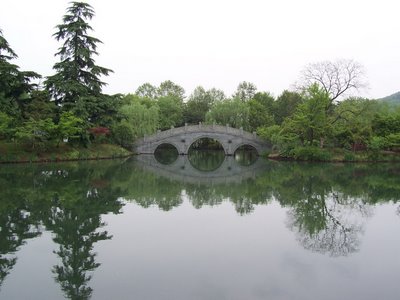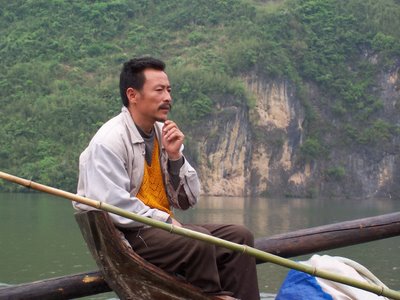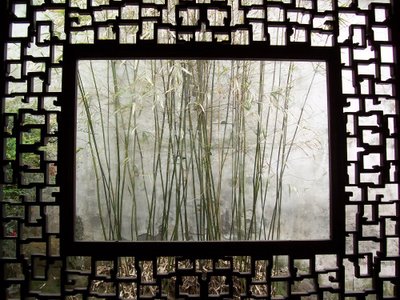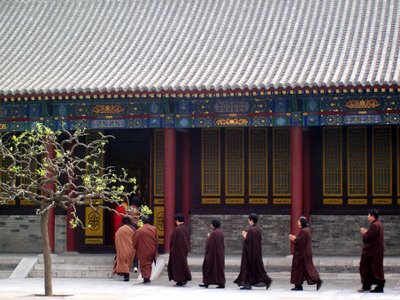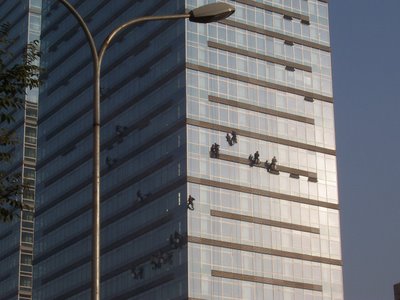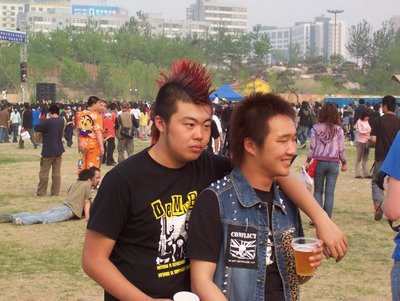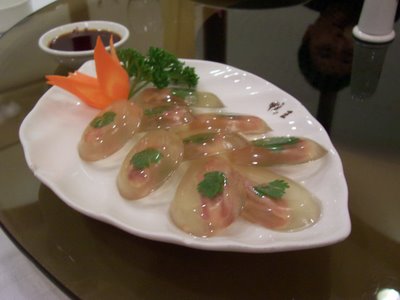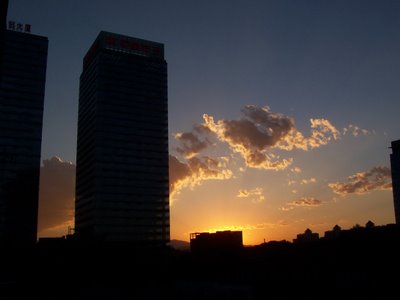Spaghetti Soup
So, I promised to write about my impressions of the workshop I attended last week at CCAST, the top floor of my building, the ITP.
It was an extremely interesting meeting for many reasons, both from the physics perspective and the sociological perspective.
The workshop was a satellite meeting from the quark matter conference in Shanghai which had happened in the preceding days. It seemed that most people left that conference talking not about the physics but about Larry McLerran's comments on those who were 'shamelessly enthusiastic' about using the AdS/CFT correspondence to study heavy ion physics. In fact I'm not sure I heard much else about the conference in Shanghai. You should really have a look at the file here so as not to take the above comments out of context.
The workshop here in Beijing could be subdivided into three parts. There were two sets of review lectures, one on AdS/CFT in general and one on AdS/CFT with respect to quark-gluon plasma. Then there were lectures by heavy ion physicists using these techniques in their work and finally there were AdS/CFT people who were going into these calculations from the other direction. Oh, and there was me. I had been invited off the back of a talk I gave in Wuhan to give a seminar on AdS/CFT and hadron physics. Slightly off the main subject but it turned out, for me, to be one of the most enjoyable talks I'd given. The difference between this and talks I gave a year or so ago is pretty big. Still a long way to go but at least it feels like progress.
I spoke with many of the physicists there about their past, present and future work and from these conversations and both the lectures and the questions being asked it seemed that this subject is currently extremely dynamic. Physicists coming at the problem from both directions are finding their way and meeting in the middle to come up with some extremely exciting results.
Probably the most exciting results come in those regimes where not only do the lattice results not predict those seen at RHIC but those calculations where one simply can't ask the questions on the lattice. These are questions of dynamics, in particular, transport coefficients.
One of the most interesting talks was by Urs Wiedemann who seems to have been a key player in a lot of the work in this subject (I say this with little knowledge of the subject other than reading some of the recent AdS/CFT - QGP papers before coming to the workshop). I believe it was he who conjectured the non-perturbative definition of the jet-quenching parameter in terms of Wilson lines.
These Wilson line expectation values are pretty easy to calculate in the AdS/CFT correspondence for pure AdS_5xS^5 or the black hole background, or even in more complicated backgrounds. It turns out that the results one gets from these calculations give good agreement with the results at RHIC. What is more is that predictions are continually being made and these will be tested at RHIC and at the LHC.
There are many other interesting results, related to the dependence on the number of colours, the temperature and the wind velocity amongst other things plus evidence that all gravity duals are in the same universality class, giving exactly the same result for the ratio of the shear viscosity to the entropy density. This result again ties in very well with the low viscosity of the quark gluon plasma seen at RHIC.
I would recommend these overviews (1,2) of the subject and these recent papers showing where we're at now.
Calculating the jet quenching parameter from AdS/CFT - Liu et al.
Holography of radiation and jet quenching - Sang-Jin Sin and Ismail Zahed
Strongly coupled quark gluon plasma: The Status Report - Edward Shuryak
Drag force in AdS/CFT - Steve Gubser
Dissipation from a heavy quark moving through N=4 super-Yang-Mills plasma - Friess et al.
(This is another good overview. Anyone who wants to suggest their own or somebody else's pdf or ppt here is free to do so. Backreaction has a recent post though the link to the original post with more detail about AdS/QCD and the QGP doesn't seem to work from where I'm sitting).
At the end of the conference was a banquet where the AdS/CFT quark matter workshop joined the heavy flavour workshop at Tsinghua university. A fine meal and some very enjoyable chat at the table with physicists from around the world. When I was asked what research I did I naively mentioned that my work was related to string theory. This was received with a few chuckles but followed by some quite aggressive remarks and the usual questions about what string theory has done for us and isn't ten years quite enough time for the AdS/CFT correspondence to have been proved. I know that this is probably a daily occurrence for most string theorists but in my somewhat sheltered position here at the ITP, this is the first time I've got into such a discussion where those asking the questions sounded more angry than amused. Speaking with one physicists, a very friendly chap on all other physics subjects, whenever we got near string theory a sneer of derision appeared and another haughty comment as to the facile nature of the quest was made.
This was an eye opener to me to see the other side of what appears to be a fence where before I wasn't even aware that such a fence existed. Naive, I know! It's a rather strange situation where I'm sure that both sides feel like they're talking to proponents of intelligent design (I don't equate string theorists or non string theorists to intelligent design advocates). The other side seemingly won't listen to the debate and the evidence is clearly stacked up with the illusion of perspective. This debate has been had many times on many blogs and though I will not to censor anything (unless it is, in my opinion, in bad taste or overwhelming the overall aim of this blog) I'm not going to try and start something here which seems to have failed many times already. It's clear that whatever the situation, there will be many who are not going to be completely happy until either string theory is ruled out or proved beyond all reasonable doubt. As we gain more and more understanding into the fundamental nature of the universe it seems, unsurprisingly, that such definitive decisions become harder and harder. I've made comments on this previously in relation to The Trouble With Physics.
Still, these few negative exchanges aside I felt that the flow of ideas at the workshop I attended more than made up for those people who believe that a wild goose chase is in progress. It was an extremely enjoyable opportunity for me to learn from those working in a different area to mine and also to be able to provide helpful advice. Several quark matter physicists left the conference with lists of references, jotted diagrams and explanations of equations which I'd happily provided. Such exchanges are part of the joy of the subject I work in and, though I regularly go to talks telling me how high-energy particle physics has been in the doldrums for the last 20 years (though things will soon change), it's wonderful to be in a subject that really is growing, developing and producing results all the time.
